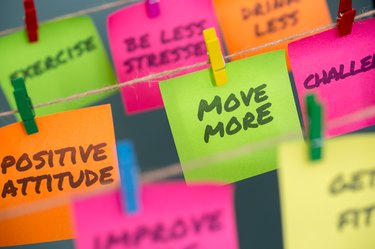
If your goal is to lose weight, it's easy to get lost in all the buzz about what to eat and avoid and even when to eat and not. No wonder, then, that you might end up adopting seemingly "healthy" habits that actually undermine your success.
The good news is that it only takes a few small changes to lose weight for real. Here, some of the most common weight-loss mistakes and the easy tweaks that can set you back on the right path.
Video of the Day
Video of the Day
1. You Drink a Pumped-Up Smoothie Every Day
A smoothie — typically, a blend of fruit, veggies, milk (dairy or nondairy), nut butters, seeds and even oats — can be an incredibly healthy addition to your diet. But also, sometimes, not.
"Smoothies can be great, balanced meals — or they can be half a day's worth of calories in a glass," Amy Gorin, RDN, a plant-forward registered dietitian nutritionist in the New York City area, tells LIVESTRONG.com.
Fix it: To keep calories in check, Gorin recommends using one healthy fat and sticking to one portion size. That, she says, equates to one-third an avocado, a tablespoon of nut butter or about a quarter cup of nuts. For a guide, try her Blueberry Peanut Butter Smoothie.
Make Your Smoothies Healthier
Avoid the most common smoothie-making mistakes and get five more healthy recipes to try.
2. You Swear Off [Insert Favorite Food Here] Forever
Your intentions come from a good place: You notice that you reach for the chips every afternoon or always go for the loaded burger when you're out to eat. So, you tell yourself that those foods are off-limits now in the name of good health.
"This is an approach that often backfires. If you love french fries, but they're off-limits, it's going to be nearly impossible to deal with this restriction forever," says Samantha Cassetty, RD, a nutrition and weight-loss expert with a private practice in New York City and co-author of Sugar Shock.
Fix it: Ditch the all-or-nothing thinking.
"The truth is, it's OK to eat french fries or anything else you want," Cassetty says.
What matters more than perfection is consistency, so after a burger-and-fry meal or taco Tuesday out, get back to your healthy habits the next meal.
It will also help to add in strategies that allow you to enjoy those favorites within reason, says Gorin. For example: When going out for ice cream, order a kid-sized scoop of your favorite double-chocolate fudge.
Related Reading
3. You’re Overcompensating With Exercise

Whether you're heading to the gym in hopes of burning calories before a planned splurge (like before a party) or catching a spin class to make up for the tacos and margaritas from last night, exercise cannot compensate for your diet.
"The truth is, exercise is only about 20 percent of the job. If you want to lose weight, you'll be much more effective by making changes to what you eat," Cassetty says.
Plus, many people find that working out revs up their appetite, and they eat more to compensate or are less active for the rest of the day, she says.
Fix it: Exercise may not be the X-factor in weight loss, but it is key to maintaining that weight loss in the long run, according to February 2019 research in Obesity. What's more, exercise, says Cassetty, is important for non-weight-related reasons, like good mood and sleep.
Instead of making physical activity a kind of punishment, practice movement that feels enjoyable to you — that way, you're more likely to turn it into a long-term habit and reap all the health benefits.
Tip
If you’re over-relying on exercise, feeling anxious about not doing it or skipping out on time with friends and family to do it, now may be the time for some soul-searching to analyze if overexercising is a problem for you and if you could benefit from outside support or therapy.
4. You’re Drastically Cutting Calories
If the very basic principle of losing weight is to eat fewer calories than you expend through activity, it would almost make sense, then, that eating fewer and fewer calories would speed you toward your goals faster.
But honestly, you'll feel rotten — fatigued, irritable, preoccupied with food, prone to binges — if you don't eat enough food.
"You need enough calories to support your level of daily activity, including exercise. I guarantee you that feeling low on energy, miserable and hungry is not the way to accomplish your goals," Gorin says.
Eating too few calories for too long can also negatively affect your metabolism, she says, which can make it harder to lose weight and might even cause weight gain.
Fix it: Calorie goals differ for everyone based on things like weight, sex and age, but Gorin cautions against eating fewer than 1,200 per day for women or 1,500 for men.
A registered dietitian can help you determine the number you need that will get you to your goals while helping you feel great.
5. You Hyper-Focus on Diet and Exercise

Adequate zzzs — that's seven to nine hours a night for adults, per the National Sleep Foundation — is crucial for both losing and maintaining your weight, as sleep affects hunger hormones, fat storage and the health of your gut microbiome.
Likewise, there are other factors that play into your ability to lose weight, like stress, Cassetty says.
The point being, you shouldn't discount your body's other needs, like sleep and self-care, in the name of your exercise routine or diet plan.
What's more, being too hyper-focused on your diet can backfire. March 2014 research in Appetite found that when people thought of a slice of chocolate cake as a "guilt food," they were less likely to stick to their intentions to eat healthy and were ultimately less successful at losing weight compared to those who saw cake as celebratory.
Fix it: While consistency is important, if you are having a rough week, it's OK to catch up on sleep rather than waking up early to hit the gym, and it's totally fine to cancel plans to make room for self-care that will help you reduce stress. Wellness is about way more than calories in versus calories out.
Related Reading
6. You’re Eating 'Diet' Foods
The lure with packaged diet foods is that you feel safe eating them — you don't have to figure out how to count what's in your sandwich or stir-fry. It's all there for you.
The problem is, these packaged foods — even if they're in line with the current diet you're following — are generally overly processed.
"The latest evidence suggests that overly processed foods promote weight gain because it's easy to eat them faster and because you feel less satisfied when you eat, so you need more to fill up," says Cassetty.
These foods are also likely devoid of fiber and water, components of meals that fill you up, she says.
Fix it: Stick with whole, minimally processed foods (think: whole fruits and veggies, whole grains, nuts and seeds) for the greatest range of nutrients and diet satisfaction.
7. You’ve Hopped on a Trendy Diet

Your neighbor lost a ton of weight doing keto. The guys at work are doing intermittent fasting (IF). You think: Maybe I should join the club.
"I remind people that just because your best friend lost weight following a particular plan doesn't mean it's right for you," Cassetty says.
Sometimes your lifestyle or schedule wouldn't work with a diet like IF, which involves shortening your eating window to sometimes 8 to 10 hours (and fasting for the remainder).
Keep in mind that research shows there is no best diet for everyone. In fact, in a February 2018 study in JAMA on 609 people, there was no difference in weight loss after a year from people who followed a low-fat or low-carb diet. That means that choosing one that works for you in terms of your schedule, food tastes and preferences can work just as well as the latest diet everyone else seems to be trying.
Fix it: "People respond to different plans differently, so it's a good idea to know what's important to you and what trade-offs you might be willing to make and find a way to lose weight that aligns with those values," Cassetty says.
Again, a registered dietitian can help point you in the right direction, because you don't have to do this alone.
- Obesity: "Physical Activity Energy Expenditure and Total Daily Energy Expenditure in Successful Weight Loss Maintainers"
- National Sleep Foundation: "National Sleep Foundation Recommends New Sleep Times"
- Appetite: "Chocolate cake. Guilt or celebration? Associations with healthy eating attitudes, perceived behavioural control, intentions and weight-loss"
- JAMA: "Effect of Low-Fat vs Low-Carbohydrate Diet on 12-Month Weight Loss in Overweight Adults and the Association With Genotype Pattern or Insulin Secretion"


